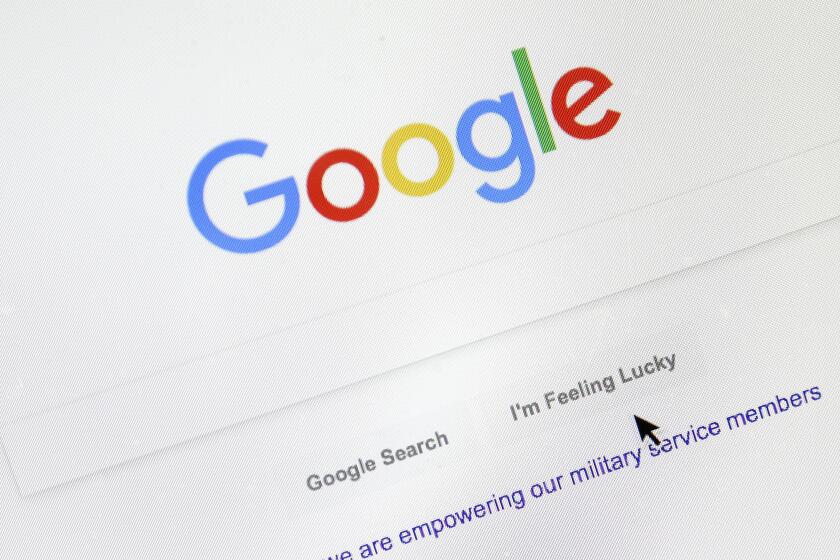Phone Ruling Puts Bush on Spot
A federal court ruling Friday has put the White House in an election-year quandary: Should it back big local phone companies in their drive to undo regulations or side with consumer groups by supporting a plan they say will bring more choices and lower prices?
The Bush administration had hoped the U.S. Circuit Court of Appeals in Washington would head off such a dilemma by agreeing to give SBC Communications Inc., Verizon Communications Inc. and other Baby Bells more time to negotiate pacts with rivals like AT&T; Corp. and MCI Inc. for leasing Bell local-phone networks.
Instead, the court affirmed that a contentious set of rules designed by the Federal Communications Commission to spur competition would be thrown out June 15, giving the Bells more power to raise wholesale rates.
Now Bush’s advisors must decide whether to appeal to the Supreme Court, as a majority of the FCC commissioners and consumer groups would like, or to let the ruling stand, as the Bells prefer.
Telecom analyst Blair Levin, a former FCC official, said many in Washington were nervous about the situation: “Nobody is really confident the White House decision is going their way.”
President Bush was briefed on the matter before leaving for Italy on Thursday, sources said. But the White House declined to give any hint about which way Bush was leaning. A spokesman would only repeat an earlier statement that the administration preferred commercial agreements over further litigation and urged both sides to “resolve their differences.”
The Bells have mounted an intense lobbying campaign to persuade the White House to accept the circuit court decision, and they were pleased by Friday’s ruling.
“It is in the best interests of consumers and the nation’s economy to let the clock run out on these illegal rules that have done so much to eliminate jobs, shrink investment and hurt fair competition,” said James D. Ellis, general counsel of SBC, California’s dominant local phone company.
That’s not how rivals such as AT&T; and Talk America Holdings Inc. see it. They have heavily lobbied the administration to appeal.
“It would be a shame if that [competition] is snuffed out by the appeals court decision,” said Gabriel Battista, executive chairman of Reston,Va.-based Talk America.
“Something this important needs to go to the Supreme Court.”
A 3-2 majority of the FCC already has vowed to appeal. But support from the solicitor general, the administration’s voice in the Supreme Court, would greatly improve the chances that the high court will agree to take the case.
Set against the specter of rising phone bills, the issue is growing into another political headache for Bush. Consumers already are fretting over higher prices for gasoline and milk, and some key swing states are still waiting for an economic recovery to take hold.
The regulations at issue have helped foster more competition and reduce telephone bills since their adoption last year by a divided FCC. Nearly 20 million U.S. residents have switched their local service to Bell rivals, and consumers and small businesses in the United States are saving about $16 billion a year from lower prices, according to several studies.
Without the FCC rules, the Bells would be free to raise the wholesale rates they charge to allow rivals to plug into their massive phone networks. AT&T;, MCI and other competitors say price hikes will force them to raise the prices they charge consumers, abandon some calling plans or pull out of some states altogether.
The Bells believe that their biggest rivals won’t bargain in earnest unless the administration withholds its support for a Supreme Court review.
Should the Bush team direct the solicitor general to appeal and the Supreme Court keep the rules in place while it decides whether to take the case, regulatory uncertainty could hang over the industry for a year or longer.
Still, AT&T; and MCI executives believe an appeal is necessary. They say that unless the Bells believe the government wants to keep the rules, the Bells won’t negotiate lease agreements in good faith.
“The sooner this issue plays out, the better it will be for the stability of the industry,” said Herschel Abbott, vice president of governmental affairs at BellSouth Corp., which serves customers in the Southeast.
Marathon negotiations aided by the FCC over the Memorial Day weekend produced little. Although a deal between MCI and Qwest Communications International Inc., the Baby Bell serving 14 Western states, was announced after the session, it had been reached before the weekend.
If the White House does not direct the solicitor general to challenge the appellate ruling and leaves the FCC on its own, the move would represent a break with past practice. The solicitor general has defended FCC rules in previous cases stemming from the Telecommunications Act of 1996. The law sought to break up the monopoly world of local telephone service.
Without the solicitor general, an appeal would still be pursued by the FCC, the Bell rivals and the National Assn. of Regulatory Utility Commissioners. The parties also will be seeking a stay of the circuit court’s decision to keep the current regulatory framework in place.
A refusal by the Supreme Court to grant a stay would leave state regulators with the job of arbitrating impasses over wholesale rates that might arise between the Bells and their rivals. States have up to nine months to arbitrate a rate dispute, and Michigan regulators already have indicated that they plan to review any proposed rate increases.
Consumer prices aren’t likely to rise anytime soon, Bell executives say. It would take at least three months for the Bells to change existing lease agreements because most of the contracts require them to give 90 days’ notice of any change in terms, they say.
Such increases are exactly what the rivals fear, and those could be in effect by this fall -- enough time to make political hay before the presidential election in November.
Like other Bells, Verizon Communications Inc. said it would hold the line on rate hikes for the short term.
However, Executive Vice President Tom Tauke said consumers might see changes “over the course of six months to a year.” He wouldn’t say how high prices could go.



